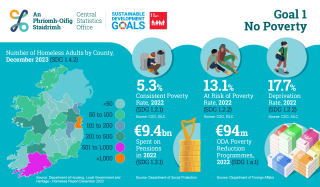Ireland's progress towards achieving the UN SDGs - Goal 1 No Poverty 2024

In September 2015, all 193 United Nation Member States adopted the 2030 Agenda for Sustainable Development ("Transforming our World"). The focus of the 2030 Agenda is the 17 Sustainable Development Goals (SDGs) and their 169 targets. Goal 1 is No Poverty - to end poverty in all its forms everywhere. The Central Statistics Office (CSO) recently published a 2024 update on Ireland's UN SDGs - Goal 1 No Poverty 2024 examining progress made.
CSO Report Findings
- Target 1.2 relates to reducing poverty as nationally defined. In Ireland, the national social target for poverty reduction is to reduce consistent poverty to 2 per cent or less. In the 2022 Survey on Income and Living Conditions (SILC), the rate of consistent poverty was 5.3 per cent compared to 4.0 per cent the previous year.
- The consistent poverty rate for females of 5.7 per cent was higher than the male rate of 5.0 per cent in 2022.
- Young people were more likely to be in consistent poverty than older people. In 2022, the consistent poverty rate was 7.5 per cent for people under the age of 18, compared with a rate of 3.3 per cent for people aged 65 years and over.
- The consistent poverty rate in urban areas was 5.7 per cent in 2022, above the rate of 4.6 per cent in rural areas.
- The consistent poverty rate is heavily influenced by the number of people at work in a household. In 2022, the consistent poverty rate in a household with no people at work was 13.8 per cent, over twice the rate of 6.5 per cent where one person is at work.
- The CSO note that "While it is disappointing to see an increase in the consistent poverty rate, as it had been steadily declining since it peaked at 9.0 per cent in the 2013 survey, some caution must be exercised in interpreting the figure as it is based on 2021 income, a period when the COVID-19 pandemic significantly impacted incomes. In addition, measures from Budgets 2022 and 2023 are not reflected in the incomes data".
- The Report also states that "In terms of Target 1.3, which relates to implementing social protection systems with substantial coverage of the poor and vulnerable, Ireland continues to have one of the most effective systems of social transfers in the EU in terms of poverty prevention. In the 2022 survey, the at risk of poverty rate before social transfers would have been 36.5 per cent. After social transfers, it was 13.1 per cent, which is a poverty reduction impact of 64.0 per cent.

GIVING A VOICE TO THOSE
WHO DON’T HAVE A VOICE
When you support Social Justice Ireland, you are tackling the causes of problems.
Progress?
The CSO Report sets out progress made by listing out social welfare payments made in Budget 2024, which the CSO says "represented the largest Social Protection Budget in the history of the state and included a range of measures to assist pensioners, carers, people with disabilities, and families with the cost of living through a mix of lump sum supports and increases to weekly payments. A total of nine lump sum payments were paid between November 2023 and January 2024".
However, Budget 2024 delivered less than half of what was required for Ireland’s poorest to have an adequate standard of living. The increase of €12 in core social welfare rates falls far short of the €25 needed to begin to address income adequacy among the poorest families, especially in the context of reduced purchasing power. Government has yet again reneged on the commitment it made in the Programme for Government to protect core social welfare rates; it has failed to benchmark social welfare or adequately compensate for inflation.
Welfare payments target those most in need within Irish society. They also play a central role in alleviating poverty. As noted, without the social welfare system almost four in every ten of the Irish population would be living on an income below the poverty line. Welfare payments reduced the poverty rate by 23 percentage points to 13.1 per cent. A lesson from past experiences is that the weakest in our society get left behind unless welfare increases keep track with increases in earnings elsewhere in the economy. If divides open up, as in the late 1990s, poverty for this group will rise. We regret that sufficient progress towards this benchmark was not delivered as part of Budget 2024. Despite challenges, we believe that the resources were available to deliver this increase.
New poverty and deprivation figures are due to be released in the coming months. These will show if Government is doing enough to deliver on its promise to deliver on Goal 1 - ending poverty in all its forms everywhere.
